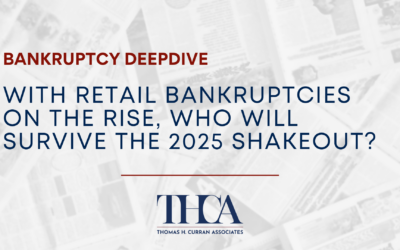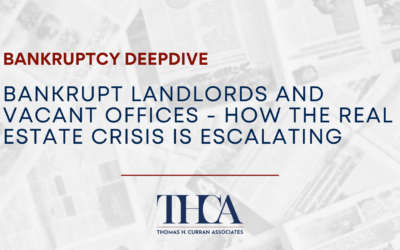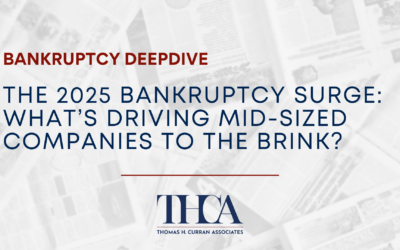Bankruptcy Facts & FAQs
What is Bankruptcy?
What are the Different Types of Bankruptcy?
- Chapter 7 is known as a “liquidation bankruptcy” and provides for the liquidation of an individual’s or business’s non-exempt assets to repay creditors.
- Chapter 9 provides for what is known as “municipal bankruptcy” and gives financially distressed municipalities protection from creditors while negotiating a plan to reorganize their debts.
- Chapter 11 allows viable businesses and some individuals to reorganize and restructure their debts utilizing a payment plan.
- Chapter 12 allows family farms and fisherman to reorganize their debt to avoid the liquidation of their assets or foreclosure.
- Chapter 13 allows individuals earning a regular income to reorganize their debts by developing a payment plan for creditors.
- Chapter 15 provides for international cross-border bankruptcies.
What is Chapter 7?
What is Chapter 11?
What is Chapter 13?
Chapter 7 vs 11 vs 13
Who Should File for Bankruptcy?
What Debts are Eliminated in Bankruptcy?
Additionally, while a debtor can eliminate most debts through bankruptcy, the proceedings do not remove any liens creditors may have on the debtor’s property. Therefore if the debtor has debt secured by a lien on the property, the debt may be discharged through bankruptcy, but the creditor will still have the right to recover its collateral.
Will Filing for Bankruptcy Hurt my Credit?
What is Chapter 15?
Chapter 15 also grants foreign creditors the right to participate in cases before the U.S. Bankruptcy Courts and bars the courts from discriminating against foreign creditors. Finally, it requires that foreign creditors be notified of U.S. bankruptcy cases and of their right to file claims.
How Can Thomas H. Curran Associates Help?
Bankruptcy Practice Results
Recent successful cases handled by the attorneys from Thomas H. Curran Associates. Find more here »
Supreme Court Denies Final Appeal, Finalizing Judgement Obtained by THCA
On June 24, 2024, the Supreme Court of the United States declined the petition to review filed by Sean Dunne and his ex-wife Gayle...
Thomas H. Curran Associates Secures Appellate Victory as Massachusetts Supreme Judicial Court Denies Appellant’s Attempt to Shortcut Ordinary Appellate Review
Thomas H. Curran Associates recently obtained an appellate victory in the Massachusetts Supreme Judicial Court on May 26, 2023, in the...
Thomas H. Curran Associates win is Affirmed in Florida, U.S. District Court – Client Wins Attorneys Fees
Law: Federal Rule of Civil Procedure 37(a)(5) Case: Premier Capital, LLC v. Larry Bryan (AP) Underlying Bankruptcy Case: In re Larry Bryan...
The Second Circuit Affirms Bankruptcy Fraud Judgment Obtained by Thomas H. Curran Associates, Recognizing the Continuous Concealment Doctrine
Law: Continuous concealment doctrine, 11 USC § 727(a)(2)(A), In re Olivier, 819 F.2d 550 (5th Cir. 1987); In re Boyer, 328 F. App’x 711,...
Thomas H. Curran Associates prevails on barring discharge due to fraud by debtor
Thomas H. Curran Associates recently secured a victory on behalf of an institutional asset manager, where the Bankruptcy Court for the...
Thomas H. Curran Associates prevails on post-trial motions and obtains full security for $23 million dollar financial fraud judgment on behalf of chapter 7 bankruptcy trustee
On February 8, 2022, the United States District Court for the District of Connecticut (Meyer, J.) enter its Order denying defendant Gayle...
Supreme Court Denies Final Appeal, Finalizing Judgement Obtained by THCA
On June 24, 2024, the Supreme Court of the United States declined the petition to review filed by Sean Dunne and his ex-wife Gayle...
Thomas H. Curran Associates Secures Appellate Victory as Massachusetts Supreme Judicial Court Denies Appellant’s Attempt to Shortcut Ordinary Appellate Review
Thomas H. Curran Associates recently obtained an appellate victory in the Massachusetts Supreme Judicial Court on May 26, 2023, in the...
Thomas H. Curran Associates win is Affirmed in Florida, U.S. District Court – Client Wins Attorneys Fees
Law: Federal Rule of Civil Procedure 37(a)(5) Case: Premier Capital, LLC v. Larry Bryan (AP) Underlying Bankruptcy Case: In re Larry Bryan...
The Second Circuit Affirms Bankruptcy Fraud Judgment Obtained by Thomas H. Curran Associates, Recognizing the Continuous Concealment Doctrine
Law: Continuous concealment doctrine, 11 USC § 727(a)(2)(A), In re Olivier, 819 F.2d 550 (5th Cir. 1987); In re Boyer, 328 F. App’x 711,...
Supreme Court Denies Final Appeal, Finalizing Judgement Obtained by THCA
On June 24, 2024, the Supreme Court of the United States declined the petition to review filed by Sean Dunne and his ex-wife Gayle...
Thomas H. Curran Associates Secures Appellate Victory as Massachusetts Supreme Judicial Court Denies Appellant’s Attempt to Shortcut Ordinary Appellate Review
Thomas H. Curran Associates recently obtained an appellate victory in the Massachusetts Supreme Judicial Court on May 26, 2023, in the...
Thomas H. Curran Associates win is Affirmed in Florida, U.S. District Court – Client Wins Attorneys Fees
Law: Federal Rule of Civil Procedure 37(a)(5) Case: Premier Capital, LLC v. Larry Bryan (AP) Underlying Bankruptcy Case: In re Larry Bryan...
Bankruptcy Areas of Expertise
- Bankruptcy Litigation
- Bankruptcy Trustee Representation
- Avoidance & Recovery Actions
- Chapter 11 Trustees & Examiners
- Discharge Litigation
- Bankruptcy Fraud Investigations
- Cross Border Foreign Litigation
- 363 Bankruptcy Sales
- Bankruptcy Preference Actions
- Involuntary Bankruptcy
- Chapter 11/13 Plan Objections
Bankruptcy News
With retail bankruptcies on the rise, who will survive the 2025 shakeout?
Bankruptcies reached an unprecedented level in 2024, and the trend appears to be continuing into this year. Some notable major retailers...
Bankrupt landlords and vacant offices – How the real estate crisis is escalating
Following the pandemic, a significant transformation in the corporate work structure was inevitable, especially for professionals...
The 2025 bankruptcy surge: What’s driving mid-sized companies to the brink?
A mere two months have passed since the beginning of 2025 and chapter 11 bankruptcy filings are already steadily trending upwards compared...
Evidence of Intent to ‘Hinder’ Wasn’t Sufficient to Deny Discharge, District Judge Says
In the recent case Wylie v. Miller, 22-10952 (S.D. Mich. March 29, 2024) [1] , a bankruptcy court’s decision to deny a couple’s discharge...
Creditor’s Don’t Receive Estate Assets Recovered After the Last Chapter 13 Plan Payment
In In re McCrorey, 18-00696 (Bankr. D. Idaho Jan. 26, 2024) [1] , Chief Bankruptcy Judge Noah G. Hillen of Boise, Idaho, held that if a...
Electric Scooter Company Bird files for Bankruptcy | CNBC
Bird, the popular electric scooter rental company filed for Chapter 11 bankruptcy protection in Florida Federal Court last month. Bird's...
With retail bankruptcies on the rise, who will survive the 2025 shakeout?
Bankruptcies reached an unprecedented level in 2024, and the trend appears to be continuing into this year. Some notable major retailers...
Bankrupt landlords and vacant offices – How the real estate crisis is escalating
Following the pandemic, a significant transformation in the corporate work structure was inevitable, especially for professionals...
The 2025 bankruptcy surge: What’s driving mid-sized companies to the brink?
A mere two months have passed since the beginning of 2025 and chapter 11 bankruptcy filings are already steadily trending upwards compared...
Evidence of Intent to ‘Hinder’ Wasn’t Sufficient to Deny Discharge, District Judge Says
In the recent case Wylie v. Miller, 22-10952 (S.D. Mich. March 29, 2024) [1] , a bankruptcy court’s decision to deny a couple’s discharge...
With retail bankruptcies on the rise, who will survive the 2025 shakeout?
Bankruptcies reached an unprecedented level in 2024, and the trend appears to be continuing into this year. Some notable major retailers...
Bankrupt landlords and vacant offices – How the real estate crisis is escalating
Following the pandemic, a significant transformation in the corporate work structure was inevitable, especially for professionals...
The 2025 bankruptcy surge: What’s driving mid-sized companies to the brink?
A mere two months have passed since the beginning of 2025 and chapter 11 bankruptcy filings are already steadily trending upwards compared...
Contact Us
Are You In Need of Legal Counsel for a Bankruptcy Matter, Business Transaction, or Commercial Litigation?
Contact our team today.
Call us at (617) 207-8670 or use the quick contact form below.
Austin Office
7710 N. FM 620
Building 13-D
Austin, TX 78726
Boston Office
15 Broad Street
Suite 610
Boston, MA 02109
New York Office
17 State Street
40th Floor
New York, NY 10004
London Office
The Leadenhall Building
Level 30
122 Leadenhall Street
London EC3V 4AB
Tags: bankruptcy facts bankruptcy faqs personal and business bankruptcy attorney





